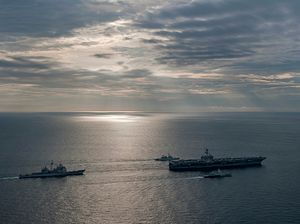The U.S State Department approved potential new multi-million dollar missile sales to Indonesia and Malaysia earlier this week.
The approvals were part of a set of five deals that the State Department cleared for U.S. allies and partners in the Middle East and the Asia-Pacific worth almost $3.5 billion. As is usually the case and as U.S. law requires, the Defense Security Cooperation Agency (DSCA) delivered the required certification notifying Congress of the potential Foreign Military Sale (FMS), which will then have to be approved before the deals are agreed with the involvement of companies and allies and partners.
The Indonesia sale involves AIM-9X-2 Sidewinder missiles and associated equipment, parts and logistical support for an estimated cost of $47 million. According to a standard statement by the DSCA outlining the sale’s impact, the proposed sale is expected to make Indonesia more capable of defeating regional threats and strengthening its homeland defense, thereby decreasing Jakarta’s need to rely on Washington while also enhancing interoperability with U.S. forces.
The principal contractor for the sale is Raytheon Missile Systems Company, and while there are no known offset requirements, DSCA notes that the implementation of the sale may require the assignment of additional U.S. government or contractor personnel to Indonesia on a temporary basis for management, oversight, or support.
The Malaysia sale involves AIM-120C7 AMRAAM missiles and associated equipment, parts, and logistical support for an estimated cost of $21 million. The sale, DSCA notes, will ensure sustained air-to-air capability for Malaysia’s existing F/A-18D aircraft, while also enhancing Malaysia’s interoperability with the United States, including regularly scheduled joint exercises and training. DSCA’s statement also refers to Malaysia as a “key partner which has been, and continues to be, an important force for political stability and economic progress in Southeast Asia.”
As was the case in the Indonesia sale, the principal contractor is Raytheon Missile Systems Company. But unlike the other deal, DSCA notes that Malaysia has requested offsets, and that the specific nature of the agreements will be defined in negotiations between the purchaser and contractor. However, implementation of this sale will not require the assignment of any additional U.S. government or contractor representatives to Malaysia.
The United States has been strengthening its ties with both Indonesia and Malaysia under the Obama administration as part of the so-called ‘pivot’ or ‘rebalance’ to the Asia-Pacific. Washington inked new comprehensive partnerships with both countries in 2010 and 2014 respectively. The leaders of both countries — Prime Minister Najib Razak of Malaysia and President Joko “Jokowi” Widodo of Indonesia — are also both expected to pay visits to Washington later this year.

































